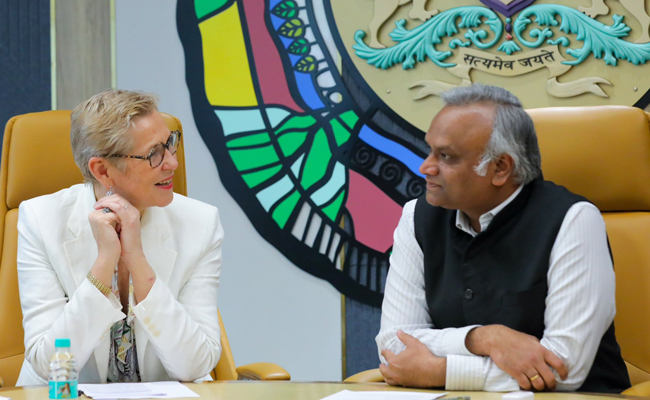New Delhi:The global economy is expected to suffer USD 5.8-8.8 trillion in losses due to the coronavirus pandemic, Asian Development Bank (ADB) said on Friday.
Of this, the impact on south Asian gross domestic product (GDP) will be to the tune of USD 142-218 billion.
"The global economy could suffer between USD 5.8 trillion and USD 8.8 trillion in losses - equivalent to 6.4 per cent to 9.7 per cent of the global GDP - as a result of the novel coronavirus disease (COVID-19) pandemic, ADB said in a new report subsequent to its economic outlook released in early April.
The GDP in south Asia will also be lower by 3.9-6.0 per cent, mainly reflecting the tight restrictions in place in countries like Bangladesh, India and Pakistan, ADB said in is updated assessment of the Potential Economic Impact of COVID-19.
The Manila-headquartered multi-lateral funding agency said that the economic losses in Asia and the Pacific region could range from USD 1.7 trillion under a short containment scenario of three months to USD 2.5 trillion under a long containment scenario of 6 months, with the region accounting for about 30 per cent of the overall decline in global output.
The People's Republic of China (PRC) could suffer losses between USD 1.1 trillion and USD 1.6 trillion.
In the Asian Development Outlook (ADO) 2020 published on April 3, the agency had estimated COVID-19's global cost to range from USD 2 trillion to USD 4.1 trillion.
Earlier on March 6, it had estimated the economic impact globally ranging from USD 77 billion to USD 347 billion (0.1 to 0.4 per cent of global GDP).
ADB said its new analysis which expects global impact of USD 5.8-8.8 trillion is excluding the impact of policy measures.
The agency's new estimate is more than double the World Bank's estimate of 2-4 decline in global GDP, and higher than the IMF's World Economic Outlook estimate of 6.3 per cent decline in global GDP.
Governments around the world have been quick in responding to the impacts of the pandemic, implementing measures such as fiscal and monetary easing, increased health spending and direct support to cover losses in incomes and revenues.
Sustained efforts from governments focused on these measures could soften COVID-19's economic impact by as much as 30 to 40 per cent, according to the new report.
"This could reduce global economic losses due to the pandemic to between USD 4.1 trillion and USD 5.4 trillion," ADB added.
The ADB analysis has used a Global Trade Analysis Project-computable general equilibrium model, covering 96 outbreak-affected economies with over 4 million COVID-19 cases.
In addition to shocks to tourism, consumption, investment, and trade and production linkages covered in the ADO 2020 estimates, the new report includes transmission channels such as the increase in trade costs affecting mobility, tourism, and other industries; supply-side disruptions that adversely affect output and investment; and government policy responses that mitigate the effects of COVID-19's global economic impact.
This new analysis presents a broad picture of the very significant potential economic impact of COVID-19, said ADB Chief Economist Yasuyuki Sawada.
It also highlights the important role policy interventions can play to help mitigate damage to economies. These findings can provide governments with a relevant policy guide as they develop and implement measures to contain and suppress the pandemic, and lessen its impacts on their economies and people.
ADB said that policy makers should work together to quickly limit the pandemic - the longer the containment period, the more difficult and prolonged the recovery will be.
"Strong income and employment protection are critical to support the most vulnerable and avoid long-term economic scarring," it said.
By May 12, the virus had spread to 213 countries and territories worldwide, infecting more than 4 million people and causing more than 2,80,000 deaths, ADB said.
On the impact on wage incomes due to the pandemics, ADB expects it to fall globally especially in the US, the EU, and the UK.
"Globally, labour income will drop between USD 1.2 trillion to USD 1.8 trillion. For Asia, the decline in wage income will range from USD 359 billion to USD 550 billion - or about 30 per cent of the global drop in wage income," it added.
The report has analysed that the macroeconomic stabilisation packages announced by various countries could raise global GDP by USD 1.7 trillion to USD 3.4 trillion (1.9 to 3.7 per cent of global GDP).
For Asia, macroeconomic stimulus could also add USD 339 billion to USD 675 billion (1.3 to 2.5 per cent of the region's GDP).
Let the Truth be known. If you read VB and like VB, please be a VB Supporter and Help us deliver the Truth to one and all.
New Delhi (PTI): Lok Sabha Speaker Om Birla on Tuesday attended the swearing-in ceremony of new Bangladesh Prime Minister Tarique Rahman in Dhaka, and said India stands ready to support Bangladesh's endeavours to build a democratic, progressive and inclusive nation.
Separately, the speaker called on the new Bangladesh prime minister and conveyed the wishes of Prime Minister Narendra Modi.
He also handed over an invitation from Prime Minister Modi to Rahman to visit India, officials said here.
“Glad to attend the swearing-in ceremony of the new government of Bangladesh led by Prime Minister Tarique Rahman in Dhaka today. India stands ready to support Bangladesh’s endeavours to build a democratic, progressive and inclusive nation,” Birla posted on X.
Bangladesh High Commissioner to India, Riaz Hamidullah, said in a post on X, “Prime Minister Tarique Rahman conveys his greetings to India and PM Narendra Modi to the visiting India Lok Sabha Speaker Om Birla at a courtesy meet following the swearing-in of the new government.
“Speaker Birla conveyed wishes and an invitation to India. Both leaders expressed optimism to work together for the well-being of the people of Bangladesh and India, pursuing a people-centric menu of cooperation.”
Birla also met Maldives President Mohamed Muizzu, Bhutan Prime Minister Tshering Tobgay and other leaders on the sidelines of the event.
Led by Rahman, the Bangladesh Nationalist Party (BNP) swept to power with a two-thirds majority with 49.97 per cent votes and 209 seats in the polls held on February 12, results for which were declared on February 13.
The Jamaat-e-Islami, which was opposed to Bangladesh's independence from Pakistan in 1971, registered its best-ever performance with 31.76 per cent votes and 68 seats.
The National Citizen Party (NCP) secured the third-highest number of seats, six, and 3.05 per cent votes.
Bangladesh had invited Narendra Modi to the ceremony, but the prime minister could not attend the event as he was scheduled to hold talks with French President Emmanuel Macron in Mumbai on Tuesday.
On reaching Dhaka, Birla said the swearing-in of Rahman was an important moment that would strengthen people-to-people relations and shared democratic values between the two neighbours.
“Honoured to be in Dhaka representing India at the swearing-in ceremony of the new government led by Tarique Rahman as the prime minister. It's an important moment that will strengthen people-to-people ties and shared democratic values between our two nations,” Birla said.
Birla was accompanied by Foreign Secretary Vikram Misri and other officials.





